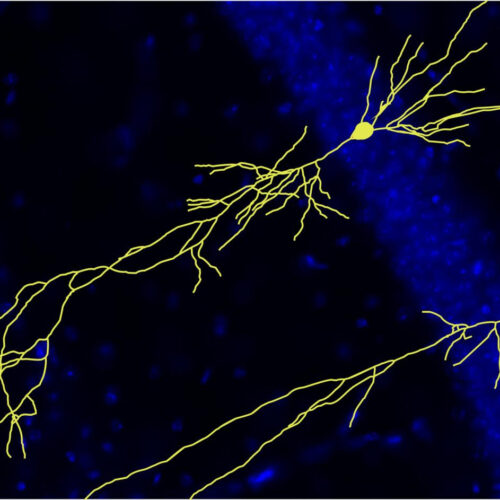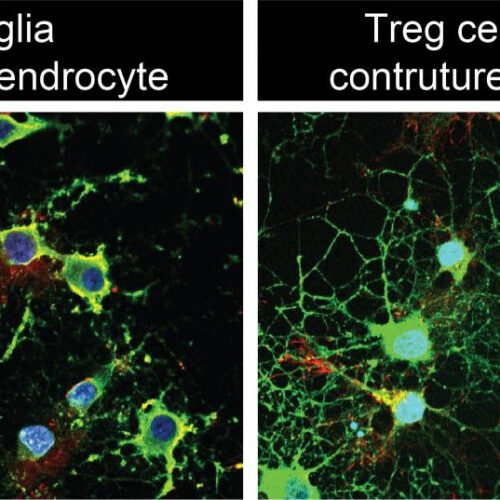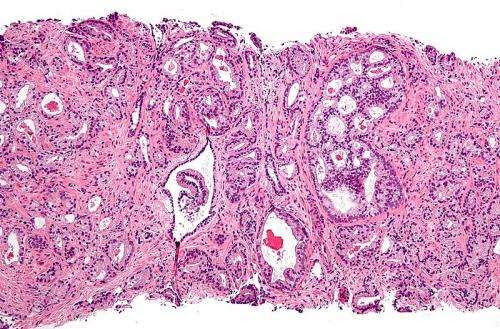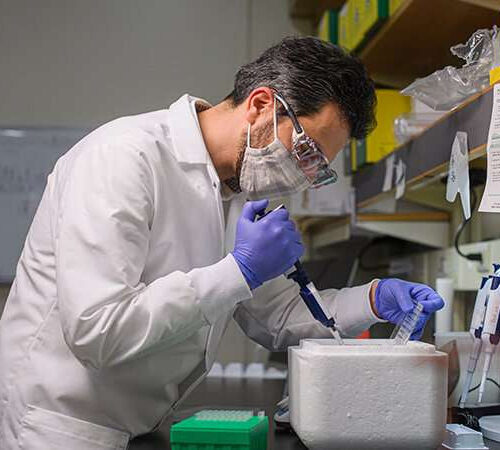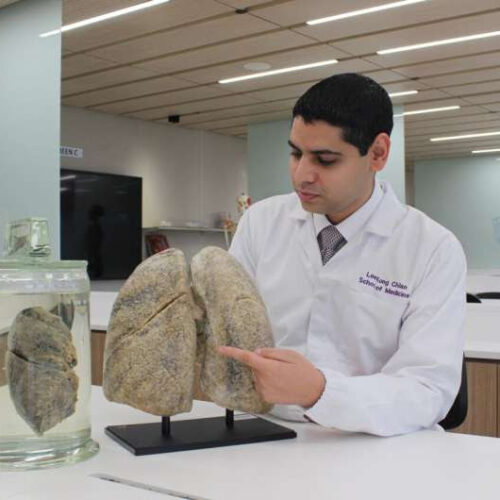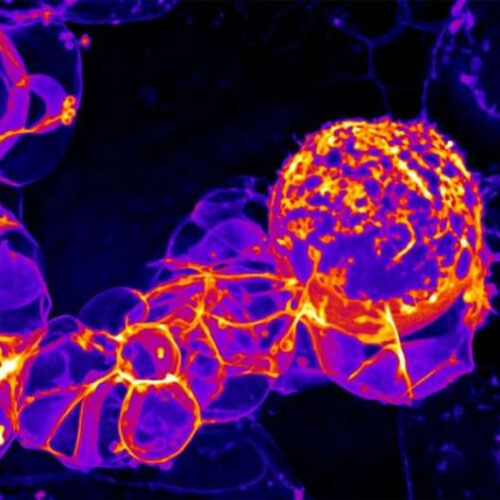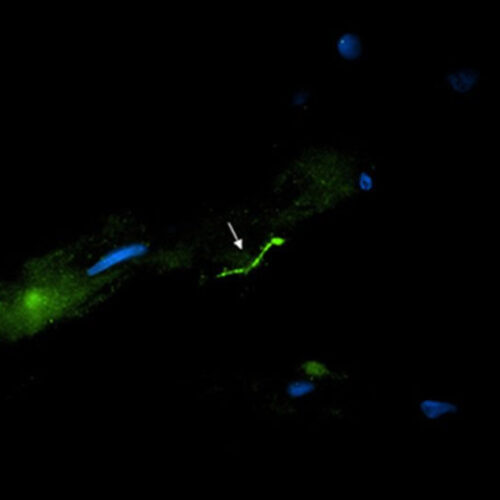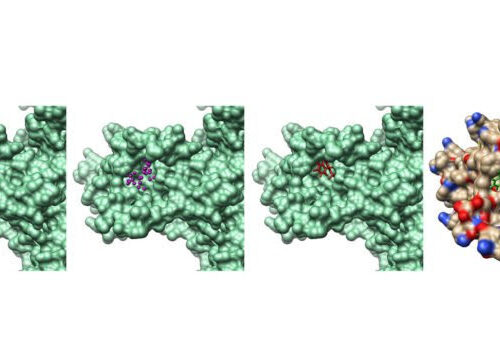UNIVERSITY OF HEIDELBERG IMAGE: LACK OF THE APP FAMILY LEADS TO ABNORMAL POSITIONING OF NEURONS (YELLOW) IN THE HIPPOCAMPUS. NEURONS LACKING APP FAMILY PROTEINS SHOW FEWER SYNAPTIC CONNECTIONS. CREDIT: SUSANNE KLEIN, PROF. MÜLLER’S RESEARCH GROUP, HEIDELBERG UNIVERSITY While the APP protein is well-known for its key role in Alzheimer’s disease, its contribution to healthy brain...
Novel immunotherapy boosts long-term stroke recovery in mice
UNIVERSITY OF PITTSBURGH IMAGE: THESE IMAGES SHOW HOW REGULATORY T CELLS (TREG CELLS) BOOST THE ABILITY OF MICROGLIA CELLS TO PROMOTE THE REGENERATION OF THE BRAIN’S WHITE MATTER (RIGHT), COMPARED TO A SAMPLE NOT TREATED WITH TREG CELLS (LEFT). CREDIT: XIAOMING HU/UNIVERSITY OF PITTSBURGH PITTSBURGH, May 19, 2021 – Specialized immune cells that accumulate in...
Rogue antibodies wreak havoc in severe COVID-19 cases
YALE UNIVERSITY The development of antibodies to the COVID-19 virus has been the great long-term hope of ending the pandemic. However, immune system turncoats are also major culprits in severe cases of COVID-19, Yale scientists report in the journal Nature. These autoantibodies target and react with a person’s tissues or organs similar to ones that cause...
Study solves mystery of how amyloid beta forms in brain nerve cells
MASSACHUSETTS GENERAL HOSPITAL BOSTON – In a major breakthrough, researchers at Massachusetts General Hospital (MGH) have discovered how amyloid beta–the neurotoxin believed to be at the root of Alzheimer’s disease (AD)–forms in axons and related structures that connect neurons in the brain, where it causes the most damage. Their findings, published in Cell Reports, could serve as a...
New insights into androgen’s action could boost battle against prostate cancer
by University of Virginia Micrograph showing prostatic acinar adenocarcinoma (the most common form of prostate cancer) Credit: Wikipedia Researchers at UVA Cancer Center have unveiled important new insights into how hormones known as androgens act on our cells—and the discovery could boost efforts to develop better treatments for prostate, ovarian and breast cancers. The findings shed light...
The COVID-19 virus may not insert genetic material into human DNA, research shows
by Purdue University The virus that caused COVID-19 likely does not integrate its genetic material into the human genome, research says. Although throughout human history there have been viruses capable of integrating their genetic material into human genes, this new study found that the COVID-19 virus, which is known to scientists as SARS-CoV-2, lacks the molecular machinery to...
Bacteria, viruses and fungi work as a network in causing lung infection
by Nanyang Technological University Through studying patients with bronchiectasis, a chronic lung condition, NTU Lee Kong Chian School of Medicine’s (LKCMedicine) Asst Prof Sanjay Chotirmall and his interdisciplinary team showed that the microbes in the body exist as a network, and that an infection’s severity could be a result of ‘negative interactions’ between these microbes –...
Researchers find cell division machinery that makes brain cells
by University of Oregon A neural stem cell and its progeny are seen under high-resolution imagery of their cell membranes in research at the University of Oregon. The stem cell is the large cell shown near the center with progeny from previous divisions, like grapes in a cluster, trailing to the left. The image is shown in false...
Study finds evidence of persistent Lyme infection in brain despite aggressive antibiotic therapy neuroscience
Tulane University researchers found the bacterium that causes Lyme disease in the brain tissue of a woman who had long suffered neurocognitive impairment after her diagnosis and treatment for the tick-borne disease. The presence of the corkscrew-shaped Borrelia burgdorferi spirochetes in the former Lyme disease patient’s brain and spinal cord were evidence of a persistent infection. The findings were...
Compound may prevent risk of form of arrhythmia from common medications
Dozens of commonly used drugs, including antibiotics, anti-nausea and anticancer medications, have a potential side effect of lengthening the electrical event that triggers contraction, creating an irregular heartbeat, or cardiac arrhythmia called acquired Long QT syndrome. While safe in their current dosages, some of these drugs may have a more therapeutic benefit at higher doses...

